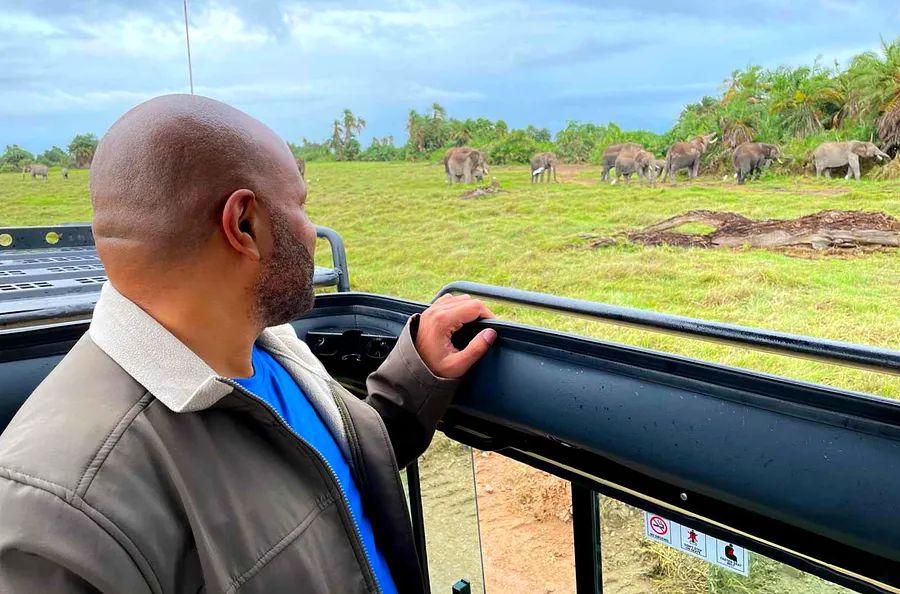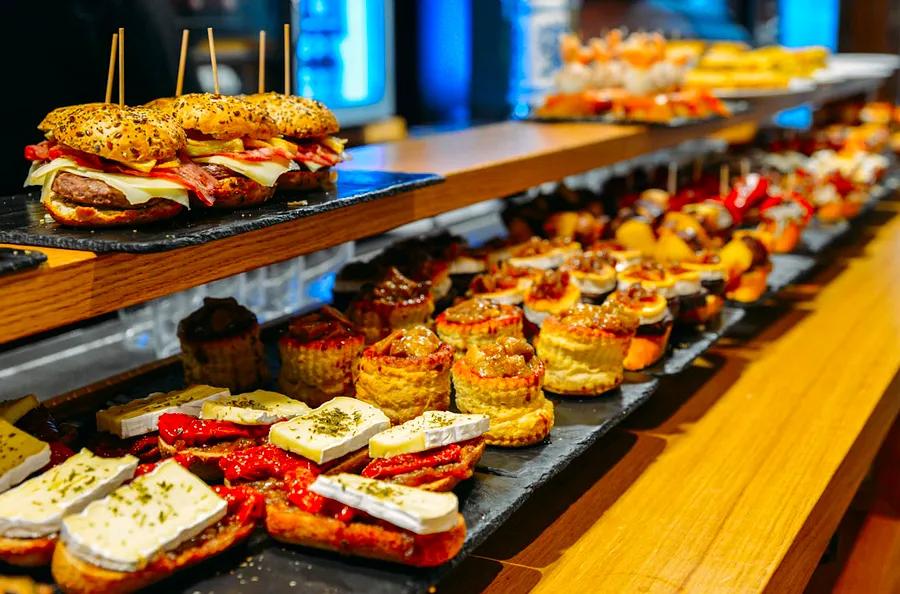A Black American's Reflections on His First Journey to Africa

 Kwin reflects on memories of elephants at Amboseli National Park.
Photo: Kwin Mosby
Kwin reflects on memories of elephants at Amboseli National Park.
Photo: Kwin MosbyFor a long time, my top travel aspirations in Africa were limited to Morocco and Egypt. However, that perspective shifted dramatically after my initial visit to Kenya. It's worth mentioning that I have a personal connection to Africa; my mother married my stepfather from Freetown, Sierra Leone, and two of my siblings were born and raised there. Despite this close bond, I never felt compelled to visit what many African Americans refer to as the 'Motherland.'
At the age of 15, I transitioned into a blended family as the only child of a single parent. Navigating the fusion of Black American and African cultures was challenging. My experiences shaped my views on Africa. Throughout my upbringing, I often overheard Black Americans express sentiments like, 'Some Africans think they're superior to us.' As a teenager, my stepfather would emphasize my American identity when introducing me to African friends, which felt like a social barrier. Over time, however, I embraced my new family and developed confidence in my identity as a Black man.
An Unforgettable Journey
It wasn't until November 2020 that my focus shifted to Africa as a top travel destination. A colleague suggested a 10-day safari in Kenya, and part of my enthusiasm stemmed from a friend's enthusiastic tales of his incredible safari experiences in Kenya and Tanzania a few years earlier. The allure of this trip was its blend of luxury, adventure, nature, and culture — all the elements I cherish in my travels.
Just three weeks later, I found myself in Kenya, enjoying stays at three Elewana properties: Tortilis Camp Amboseli, Kifaru House Lewa, and Sand River Masai Mara. With the help of Micato Safaris, I explored three different parks and reserves in pursuit of the Big Five. Additionally, visiting a Maasai village topped my agenda; I was eager to experience the renowned adumu, the traditional jumping dance integral to a Maasai warrior's initiation. This immersive journey promised not just wildlife encounters but also a deep connection with the local culture — and it truly delivered.
A Heartfelt Reception
The moment I disembarked in Nairobi, I felt a palpable difference. Just two weeks prior, I had faced racial profiling at Velana International Airport in Male, Maldives, where most individuals subjected to random bag checks were people of color. My experience at Jomo Kenyatta International Airport, however, was refreshingly different. I wasn't subjected to profiling, though customs officials diligently ensured that every traveler had their passport, e-visa, health declaration form, and negative COVID-19 test results in order.
Tune into Dinogo's 'Let's Go Together' podcast for more uplifting stories and adventures that celebrate inclusivity in travel!
While checking in with a customs officer, she promptly informed me that I needed to speak with her supervisor, as I had accidentally applied for the East Africa Tourist Visa, which would permit me to visit not just Kenya but also two other African nations.
'If you're planning to stay in Africa for three to four months, your visa also allows you to explore Rwanda and Uganda,' the customs supervisor remarked with a friendly smile. I replied, 'Wow, that's like hitting three targets with one shot.' She chuckled at my response.
Though it wasn't a profound exchange, it was the everyday interactions with Kenyans that made me feel at home and truly welcomed. This was a stark contrast to some other places where customs officials have greeted me with frowns and inquiries about my travel intentions.
Engaging With the Maasai Community
Traveling to Kenya allowed me to witness wildlife freely roaming across vibrant green grasslands, with the stunning silhouettes of Mount Kilimanjaro and Mount Kenya enhancing the breathtaking scenery. The landscapes of Amboseli National Park, Lewa Wildlife Conservancy, and the Maasai Mara National Reserve felt like a contemporary Garden of Eden. Observing leopards, cheetahs, lions, elephants, giraffes, rhinos, zebras, and countless other animals in their natural habitats was nothing short of mesmerizing.
 Two young elephants frolicking in Lewa Conservancy.
Photo: Kwin Mosby
Two young elephants frolicking in Lewa Conservancy.
Photo: Kwin MosbyDuring our morning and evening game drives, Kenya's terrain resembled a stunning oil painting, even as storms brewed in the distance on the horizon. Engaging with our tour guides was equally valuable, as it provided insights into the behaviors of the animals we encountered and allowed for genuine conversations with locals sharing their experiences from Nairobi or a Maasai village.
Building connections with locals has always been a vital aspect of travel, and Olekinyaga Polonet, a 35-year-old tour guide, was one of those meaningful encounters. Known as Godfried in English, he is a devoted husband and father of four—two daughters and two sons. His aspirations for his family mirror those of many fathers. Through our discussions, I learned about his position as a Maasai young elder and how some traditional Maasai villages remain insulated from modern influences, while others adopt simple technologies like email access.
 Kwin engaged in conversation with game drive expert Olekinyaga Polonet at Elewana Kifaru House Lewa.
Photo: Kwin Mosby
Kwin engaged in conversation with game drive expert Olekinyaga Polonet at Elewana Kifaru House Lewa.
Photo: Kwin MosbyUnlike many other indigenous tribes in Kenya, the Maasai are nomadic herders, raising cattle and goats while living off the land. Many Americans might relate to this farm lifestyle — I certainly do. Growing up, I spent considerable time with my great grandparents, who owned a farm. Much of what we ate came from their garden or livestock. Thus, living off the land was not unfamiliar to me, as farming remains a common lifestyle for many Black families in the South.
The Maasai's reliance on the land necessitates their movement wherever their herds can graze, often leading them to remote areas, which has its benefits. Conversations with Polonet and other Maasai men revealed that their isolation from larger Kenyan communities has provided them a buffer during the pandemic. Currently, there are no reported coronavirus cases among them, according to Polonet. However, the Maasai are aware of the virus due to their interactions with local safari lodges and camps, making it common to see them wearing face masks to protect their villages.
 Meoli, the son of the Maasai Chief, alongside Maasai elder Phillip at the Elewana Tortilis Camp.
Photo: Kwin Mosby
Meoli, the son of the Maasai Chief, alongside Maasai elder Phillip at the Elewana Tortilis Camp.
Photo: Kwin MosbyDue to the pandemic, tourists can no longer visit Maasai villages. However, Meoli, the 33-year-old son of the chief, shared valuable insights about his tribe's customs and traditions with my tour group during our stay at the Elewana Tortilis Camp. One notable tradition he described was the circumcision ceremony. This rite of passage for Maasai boys aged 12 to 25 requires them to endure the procedure in silence; any sign of pain, like blinking or gasping, can lead to being ostracized. According to Meoli, most boys successfully complete this ceremony, marking their journey towards becoming Maasai warriors.
Echoes of Colonialism
While the Maasai remain committed to their traditions, they have not entirely avoided contact with the outside world. Over 80% of Kenya's population identifies as Christian, and Meoli acknowledged his own Christian faith. Meanwhile, Polonet shared that he learned English at a missionary school. It's common to see tour guides and employees at hotels and safari camps wearing name tags that feature their baptismal English names. (For clarity, I inquired about the birth names of the individuals mentioned in this article.)
Some individuals have altered their names to make them more accessible for tourists. As a colleague in travel pointed out, denying them the use of their given names amounts to 'erasing their identity.' It remains uncertain whether this is an organizational policy or a personal choice. Regardless, if it is the former, it highlights a troubling trend of marginalizing African cultures. Why must names be simplified for tourists? This question deserves thoughtful consideration.
Bidding Farewell to Africa for Now
My travels through Kenya sparked a newfound interest in exploring other African nations, including Senegal, Tanzania, South Africa, and Sierra Leone. Kenya served as an excellent gateway to further adventures across the continent. According to some seasoned travelers on this 10-day journey, starting with Kenya truly sets a high standard for safaris.
 Kwin feeding endangered Rothschild giraffes at the Giraffe Centre in Nairobi, Kenya.
Photo: Kwin Mosby
Kwin feeding endangered Rothschild giraffes at the Giraffe Centre in Nairobi, Kenya.
Photo: Kwin MosbyFeeding pellets to Rothschild giraffes, adopting and meeting an orphaned baby elephant, and taking a sunrise hot air balloon ride were all extraordinary moments. My inaugural trip to Kenya and Africa was filled with delightful surprises and luxurious camping experiences, yet I prioritized connecting with locals to understand their everyday lives. This journey was life-changing. Kenya opened the door to deeper knowledge of Africa, preparing me for the day I can truly immerse myself in the cultures and communities of my ancestors. That day will come.

1

2

3

4

5
Evaluation :
5/5